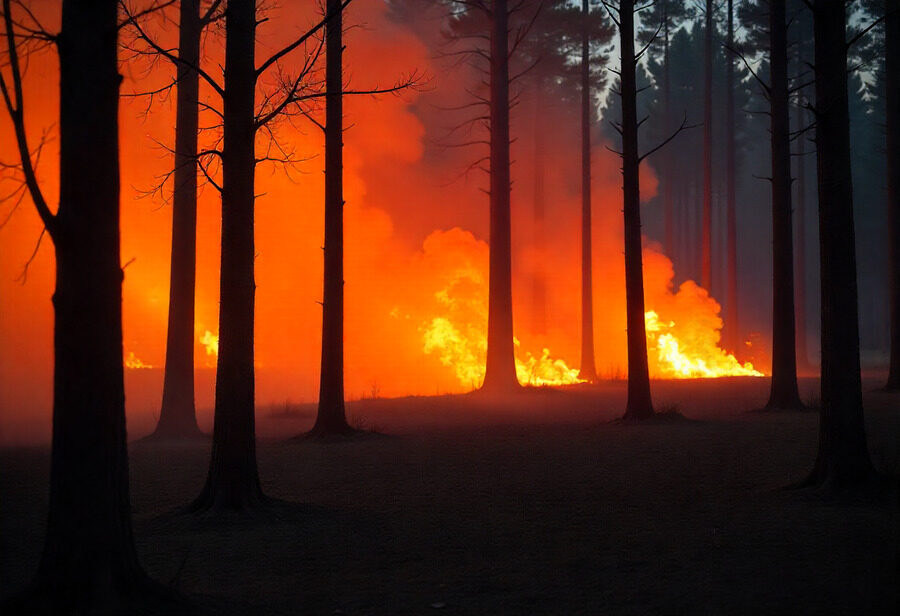Sunday, July 27, 2025
Travel chaos hits Greece as wildfires spread across the country Fuelled by a brutal heatwave which has seen temperatures top 45°C, fires are raging in parts of Athens, and popular holiday islands including Crete and Evia Thousands of residents and tourists have been evacuated as the flames continue to spread, with many left stranded in affected areas. Intense heat and gusty winds have quickly fueled the flames, and authorities have struggled to keep the blazes under control, while whole towns have been evacuated, and both flights and roads are being shut down. These mind-boggling bushfires have caused a hellish reality as communities and visitors come to terms with the devastation the fires have wrought on their lives and holiday plans.
Greece is grappling with severe wildfires, primarily caused by the intense heatwave that has plagued the region over the past week. The temperature surged beyond 45°C, triggering multiple evacuation orders as flames rapidly spread through several areas, including the northern suburbs of Athens and popular islands such as Crete and Evia. These wildfires have forced thousands to flee their homes and caused significant damage to villages, leaving residents and authorities scrambling to combat the inferno.
On Saturday, a powerful wildfire erupted in the northern suburb of Kryoneri, roughly 20 kilometers northeast of Athens. The Greek Fire Service confirmed the eruption, initiating an immediate evacuation order. Inhabitants of Kryoneri received three separate emergency SMS alerts urging them to move to safety. As the fire continued to rage, the nearby village of Drosopigi was shrouded in thick smoke. Explosions could be heard as factories housing highly flammable materials came under threat, adding to the chaos.
In response to the emergency, the Greek government deployed a large-scale operation to tackle the fire. A team of 65 firefighters, aided by 26 firefighting vehicles and two aircraft, worked tirelessly to suppress the blaze. In addition, helicopters were dispatched to drop water over the affected areas in an effort to contain the fire’s spread.
As the wildfires ravage the mainland, the situation is equally dire on Greece’s islands, including Crete and Evia, where additional wildfires have broken out. The country’s Fire Service is actively battling fires on these islands, with a significant operation on Evia involving 115 firefighters, 24 firefighting vehicles, and support from six aircraft and seven helicopters. The island’s residents in the Triada region have been placed on high alert, with the possibility of evacuation looming as strong winds worsen the conditions.
The fire department confirmed that at least 52 wildfires had erupted across Greece in just the past 24 hours. Strong gusts of wind have worsened the situation, accelerating the flames and prompting more evacuations. The fires have been particularly catastrophic in coastal regions, with local authorities urging people in high-risk areas to remain vigilant and follow evacuation instructions.
In other regions, including Kythera, residents in the villages of Aroniadika, Pitsinades, and Aryoi were forced to evacuate their homes as the fire approached. The western area of Messinia, which includes the villages of Kryoneri and Sellas, has also been significantly impacted. Due to the extreme heat and anticipated gusty winds, these areas are under heightened surveillance as the fire risk remains severe.
Greece’s national weather bureau has issued warnings that the mercury could reach 44°C on Saturday, which is expected to exacerbate the fire risk. These rising temperatures are a direct consequence of the ongoing heatwave, which has intensified the dry conditions, making the spread of wildfires even more rampant. The weather conditions have become a growing concern for both citizens and authorities as the situation continues to deteriorate.
The frequency of wildfires across Greece has been steadily increasing, and experts are now calling the country a “wildfire hotspot.” With Mediterranean countries increasingly affected by extreme heat and dry conditions during the summer months, Greece is facing an escalating environmental crisis. This surge in wildfires poses a serious threat not only to human life but also to biodiversity, infrastructure, and the economy.
Experts attribute the growing number of wildfires to a combination of climate change, prolonged heatwaves, and drought conditions. The high temperatures have dried up vegetation, creating ample fuel for wildfires to spread rapidly. As the summers grow hotter and drier, Greece, along with other Mediterranean nations, faces the urgent challenge of adapting to this new reality and mitigating the risks associated with increasingly frequent and intense wildfires.
Authorities have warned that the coming days may bring even more intense fires as the heatwave continues. The threat of further evacuations is real, and the Greek government is urging residents to stay informed and follow all emergency protocols. Local fire departments, supported by international teams, are working relentlessly to contain the blazes and prevent them from spreading further.
This wildfire season in Greece serves as a stark reminder of the devastating impact of climate change on the environment. As the country battles these blazes, it is clear that the threat of wildfires will continue to grow unless immediate measures are taken to address the underlying causes, including better forest management, fire prevention strategies, and combating climate change on a global scale.
Greece faces travel chaos as wildfires, raged by a savage heatwave that saw temperatures exceed 45C, cause evacuations across Athens and its islands. Fast moving flames saw travel disrupted and locals and tourists stranded.
For now, the people of Greece remain on high alert, with many hoping for the swift containment of the fires and a return to safety. The efforts of the fire services and local authorities will be crucial in the coming days as they strive to limit the damage and protect both lives and property from the unrelenting flames.
